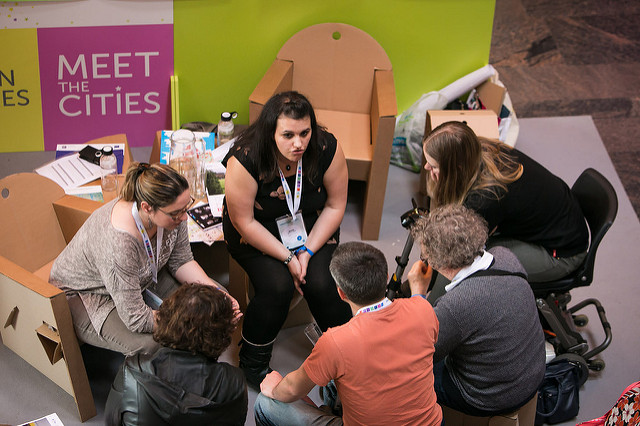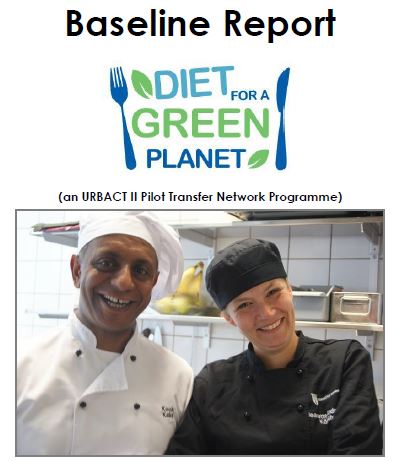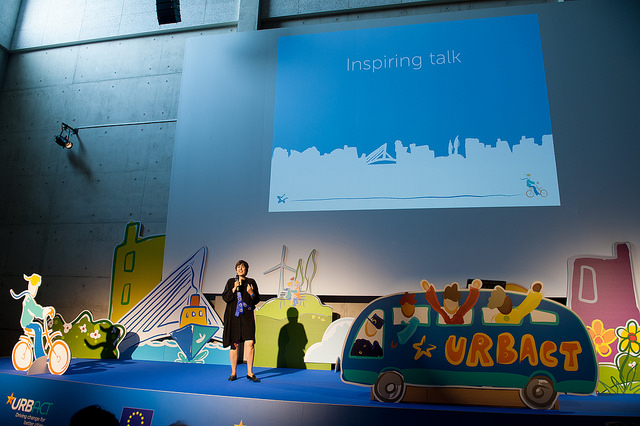We all know that in these difficult times where cities face ever increasing urban challenges linked to demographic change, climate and environmental targets, unemployment and urban poverty to name but a few, Europe’s cities are seeking practices which are relevant and overcome these barriers. Such practices as far as URBACT is concerned come in all shapes and sizes, all themes and topics. The opportunity to learn from peers and adapt and reuse tried and tested practices without reinventing the wheel is an attractive option when scarcity of resources is a daily discussion.
This article will help you to understand what URBACT is looking for when launching the Good Practice call and explain how both your city and others can benefit directly from this new and unique networking and transferring experience.
Defining a good practice for URBACT?

A good practice, as understood in URBACT, is not only a practice that is good, but a practice that has been proven to work well by ensuring desired results, and could be recommended as a model. It is a successful experience, which has been tested and validated, and deserves to be shared so that a greater number of cities can adopt it.
An URBACT Good Practice will follow the key principles of the programme around sustainable development as a main orientation for driving change in cities towards the sustainable urban living.
Practices should address issues which are widely faced by European cities and offer some clear and concrete solutions. There are no defined themes for an URBACT Good Practice. They can range from urban mobility to migrants from air quality to jobs and skills. These are only examples of urban challenges in Europe today. URBACT wants to hear from cities about their own success stories no matter the topic.
Good Practices presented as part of the call should demonstrate an
integrated approach to problem solving bringing together social, economic and environmental actions to address policy challenges in a holistic manner.
The
participatory approach is key for all URBACT projects and the Good Practice call is no different. Demonstrating strong involvement of local stakeholders in the development and implementation of the practice as evidenced in the URBACT Placemaking for
Cities Pilot Transfer network is essential. This pilot network focused on community based placemaking working with and not for communities, developing tools to manage resistance to change and encouraging collaboration across local authority departments as well as with regional and national decision makers. The city of
Syracuse, in the
Genius:Open Pilot Transfer Network
has also proved successful in engaging stakeholders to solve the problems they faced in the city.
Transferability: a key notion

This is clearly the most important requirement for any URBACT Good Practice…..why? Because we would like to be able to help other cities by transferring your Good Practice to them using the URBACT Transfer Networks as a tool.
The focus of this URBACT call is not about any good practice – there are lots of these around Europe already, some may say too many! This call is not seeking practices that have huge budgets with endless implementation challenges be they linked to public procurement, ownership or national legislation. This call is focused on identifying sustainable and affordable practices which cities can easily adapt to their local context.
Successful transfer of a good practice cannot simply come down to a copy paste of the original, past experience in URBACT networks has proved this. The process of understanding the practice in detail is the first stage. How was the practice implemented, by whom and in what specific circumstances? The second stage of the transfer process is to adapt the practice to reflect the needs and specificities of the city wishing to transfer. This stage is essential if one is to avoid the copy paste trap. Finally comes the concrete transfer which we call reuse. This stage is the real implementation of an adapted practice in your city, remembering to build in evaluation and monitoring to understand success or failure at the end.

URBACT already has some experience of transfer of good practices from one city to another. One successful example is in
Mollet del Vallès, partner in the
Diet for a Green Planet Pilot Transfer Network. The city transferred the policies developed initially in
Sodertalje through the implementation of a New Diet Policy transforming three kindergarten canteens into ecological ones by using local products, reducing meat consumption and reintroducing the canteen’s cook! (
video here) This successful transfer
was presented at the recent
HABITAT III conference in Quito.
To allow an active transfer of your good practice in other European cities, URBACT will as a second step launch a call for new Transfer Networks in autumn 2017. Some of the Good Practices gathered through the Good Practice call may then be transformed into the new successful stories of European transfer!
An excellent way to promote your city on a European platform

In these difficult times for Europe as a whole it is clearly more and more important for cities to show solidarity and help their peers to do things better and easier. If this goal alone is not enough to convince your city to present a Good Practices in this call there are plenty of other good reasons to do so!
Your city will be able to showcase its work in a European arena gaining EU wide recognition as a labelled URBACT Good Practice. Such kudos provides city leaders and politicians with evidence of the good work of the municipality and helps to position the city in different ways including attracting other financial resource to the city.
In the framework of an URBACT event, attracting hundreds of cities from around Europe, your city will be able to promote the good practice. It can also link with other interested cities to establish a network whose aim will be to understand, adapt and reuse your cities practice. The possibility, through the future Transfer Network call for your city to lead an URBACT Transfer network will provide resources which can not only help other cities to transfer your practice but will provide your city with resources for reflection on how you can improve or upscale your practice – the learning and sharing experience is never one sided.
So this is a Good Practice Call with a difference…..it covers all the usual benefits of being labelled a Good Practice but goes a step further through the principle of transferability.
The URBACT Good Practice Call
is now open – don’t miss it!
You can read more on how URBACT has been supporting the re-use of good practice across EU cities and read more in detail about 6 successful transfer stories in
here, page 114.

 A good practice, as understood in URBACT, is not only a practice that is good, but a practice that has been proven to work well by ensuring desired results, and could be recommended as a model. It is a successful experience, which has been tested and validated, and deserves to be shared so that a greater number of cities can adopt it.
A good practice, as understood in URBACT, is not only a practice that is good, but a practice that has been proven to work well by ensuring desired results, and could be recommended as a model. It is a successful experience, which has been tested and validated, and deserves to be shared so that a greater number of cities can adopt it. This is clearly the most important requirement for any URBACT Good Practice…..why? Because we would like to be able to help other cities by transferring your Good Practice to them using the URBACT Transfer Networks as a tool.
This is clearly the most important requirement for any URBACT Good Practice…..why? Because we would like to be able to help other cities by transferring your Good Practice to them using the URBACT Transfer Networks as a tool.  URBACT already has some experience of transfer of good practices from one city to another. One successful example is in Mollet del Vallès, partner in the Diet for a Green Planet Pilot Transfer Network. The city transferred the policies developed initially in Sodertalje through the implementation of a New Diet Policy transforming three kindergarten canteens into ecological ones by using local products, reducing meat consumption and reintroducing the canteen’s cook! (video here) This successful transfer was presented at the recent HABITAT III conference in Quito.
URBACT already has some experience of transfer of good practices from one city to another. One successful example is in Mollet del Vallès, partner in the Diet for a Green Planet Pilot Transfer Network. The city transferred the policies developed initially in Sodertalje through the implementation of a New Diet Policy transforming three kindergarten canteens into ecological ones by using local products, reducing meat consumption and reintroducing the canteen’s cook! (video here) This successful transfer was presented at the recent HABITAT III conference in Quito.  In these difficult times for Europe as a whole it is clearly more and more important for cities to show solidarity and help their peers to do things better and easier. If this goal alone is not enough to convince your city to present a Good Practices in this call there are plenty of other good reasons to do so!
In these difficult times for Europe as a whole it is clearly more and more important for cities to show solidarity and help their peers to do things better and easier. If this goal alone is not enough to convince your city to present a Good Practices in this call there are plenty of other good reasons to do so! Submitted by Adele Bucella on
Submitted by Adele Bucella on 